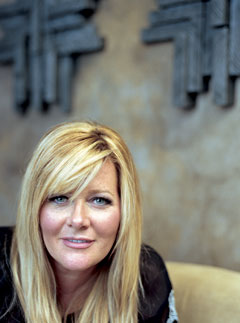


Contemporary country artist Jamie O'Neal has followed an unusual route to success. Born in Australia to musician parents, Jamie spent her childhood roaming the United States, singing with her family’s variety act at state fairs, conventions, and opening for country stars. After a stint in Las Vegas, the family spent some time in Nashville, where they recorded three self-produced albums.
But there were a few unexpected twists and turns ahead. When her parents divorced, Jamie moved to Los Angeles with her father. Later returning to Nashville, Jamie found work performing songs in a demo mill. "I was so busy trying to get a record deal, keep up my chops and basically just make a living," she recalls. "Wherever the music was, and wherever the best gig was, that's where I would go."
Jamie's career started to accelerate during a visit with her mom in Australia. "I got work touring with Kylie Minogue, doing backup vocals, and I did some TV and jingles," she says. "And I thought, this is great experience-I'm singing every day! So I stayed for a while."
When you're collaborating on a song, you have to feel comfortable enough to say, "Hey, that really sucks!"
But the real momentum began when her mother sent a demo tape of Jamie's singing and songwriting to a contact in Nashville. An enthusiastic reception prompted Jamie to return to Music City, where she started making a name for herself-not as a singer, but as a songwriter whose work was covered by artists such as LeAnn rimes and Chely Wright.

"It was great to get that far, but also frustrating, because I was still trying to get an artist deal," Jamie says. "You want to get your record deal so bad that you feel like you'll do anything to get one. People new to Nashville might think they need to be whatever someone tells them to be. But I think the important thing is to stay true to yourself and be unique as an artist, so when people hear you on the radio they'll say, 'oh, that's so-and-so' rather than, 'who's that?'"
Finally Jamie's talents as a performer caught the attention of producer Keith Stegall at Mercury Nashville. Her debut record, 2000's Shiver, was nominated for three GRAMMY Awards. "When I made that first album, it exceeded my expectations," says O'Neal. "I wrote the songs with so many great writers, and I felt so free to express myself. Before then, some people would say, 'I really like your voice but the songs aren't country enough,' and others would say, 'I like your songs, but your voice is too R&B.' but my producer, Keith Stegall, never wanted to mold me into anything other than what I was. He just got it, and brought out the best in me."
Jamie is currently working on a new record, about which she feels even more positive. "I feel like it's deeper-it really shows what I can do and what I'm about," she says. "I've gotten a lot from being on the road, meeting the fans and hearing their stories. With this record, I wanted to touch on different subjects, not just have each song sound like the last one."
These days Jamie develops her ideas at her well-equipped home studio. At the heart of the studio is a Yamaha 02R96 digital mixer, which Jamie and her recording engineer husband, Rodney Good, have come to rely on as they track demos for the next record. "We love it," says Jamie. "We've recorded lead and backing vocals on it, and it's been incredible. It works like a dream-the automation, the onboard EQ, everything about it. We haven't yet tracked any masters for the album using the 02R96, but we're planning to. To my ear, with this board we can get equal quality to anything coming out of Music Row. Yamaha has been fantastic for us."
As such a well-traveled singer/songwriter, what does Jamie make of Nashville's songwriting culture? "It's definitely a formula, and it's really different from other places," she reflects. "For example, I just had a session with a writer from London-he has a songwriting format too, but his approach is totally different from the Nashville formula. The thing about cowriting in general is that it always takes time to get to know someone. When you're collaborating on a song, you have to feel comfortable enough to say, 'Hey, that really sucks!' or 'I don't want to write that, I want to write this.' When you can say that to each other, that's when you start getting somewhere."
























